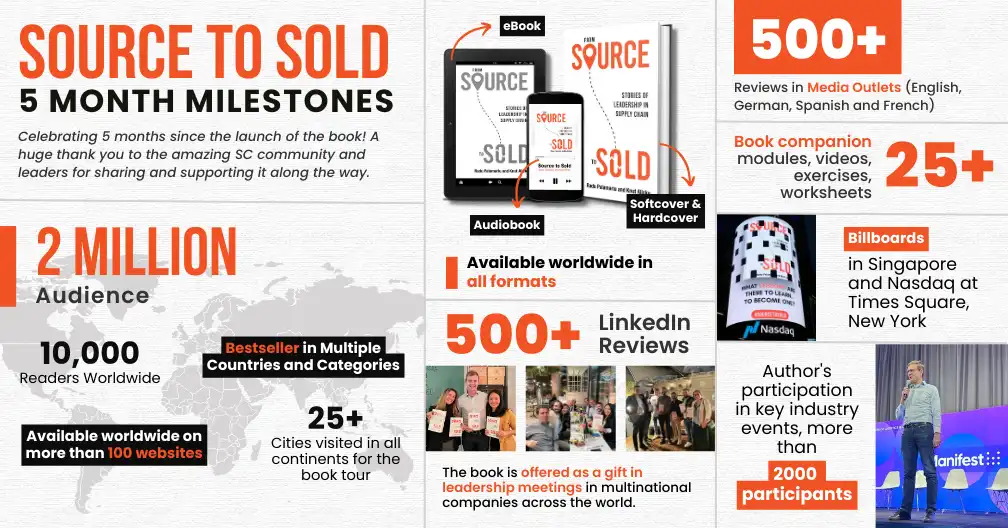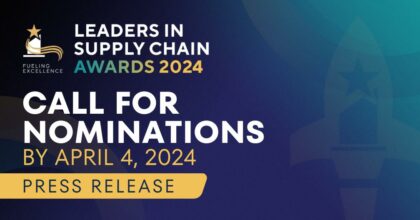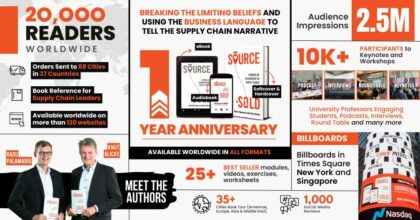Excerpts from the Book “From Source to Sold” by Radu Palamariu, Managing Director Asia Pacific & Europe, Alcott Global, and Knut Alicke, Partner, McKinsey & Company
The path to a successful career in the supply chain industry is varied and complex. As a company that does executive search for top-tier supply chain roles, we address this article to professionals looking to advance their careers or professionals looking to hire top talent in the supply chain.
The conversations with leading CSCOs and COOs in the world included in the book “From Source to Sold” by Radu Palamariu, Managing Director Asia Pacific & Europe at Alcott Global and Knut Alicke, Partner at McKinsey & Company, are a source of first-hand learning from personal leadership stories. The book contributors lead large organizations, and recruiting the top talent to help them deliver on the business objectives is one important part of their role. We have distilled in this article, what are the key differentiators they look at when hiring.
Executive search partners constantly gather such insights from the hiring managers in their efforts to identify the best fit for top-tier supply chain roles. Along with the required skills, it is these qualities that will ultimately set candidates apart when they are being considered for the role.
“The No-Nonsense approach to supply chain leadership”
When preparing for your next interviews for senior roles in supply chain, be ready to respond, with arguments and examples, to the hard questions that typically elicit the response “No, it isn’t possible”.
Vikram Agarwal, COO at Danone, refers to his recruitment style as “The No-Nonsense approach to supply chain leadership” in the book.
“When it comes to recruitment, Agarwal declares that he would always pick a person with the hunger to “fill the glass” rather than someone who would happily accept a glass half full. “I look for people who have a can-do attitude without being reckless because it’s easy to say no when working in the supply chain.
‘Can the factory increase its production in the next month?’
‘Can you reduce people in distribution by 30 percent this year?’
‘Can you launch this new product in six months’ time?’
‘Can you supply this unplanned customer order in two days?’
The usual answer to all these questions is no, so I often flip the question and ask them what it would take for them to say yes.” he states in his interview.
Another key element for him is the candidate’s attitude, and being solution-oriented, continuing:
“For me, it’s important that the person I’m working with is capable of going from ‘it can’t be done’ to ‘what does it take to get it done?’ There is always a solution, a workaround, especially in the supply chain, to reach an acceptable outcome.
Leadership potential is the next attribute on the list of what Agarwal looks for when hiring.”
“Experience and Exposure”
Dirk Holbach, Corporate Senior Vice President, and Chief Supply Chain Officer of the consumer brands division (beauty, laundry, home care) at Henkel, advises hiring managers, in the “From Source to Sold” book:
”Look at the wider context of a candidate’s experiences, rather than nitpick about the precise talent fit. “Context is important, as anyone interested and willing to learn can do well in the supply chain. You need to recruit characteristically smart people with the right attitude and place them in the right roles. This can’t be said of a technical role, as the harder the technicalities associated with a role get, the more difficult it is to broaden the scope of the talent pool.”
If there would be Maslow’s pyramid of skills, hard skills are making up the base layer of the pyramid, and without them, there’s no real chance for a career. These skills are to be honed through working in various segments of the supply chain industry and through exposure to different parts of the business.
Valuable and well-known “side-effects” of exposure are: gaining experience and forming insights that will eventually solidify the pillars of holistic and strategic thinking.
Michael Corbo, having a lifelong career with Colgate-Palmolive, since 2011 as Chief Supply Chain Officer within the company, talks about the importance of having a holistic view of the business, encouraging supply chain employees to witness working with all major segments within the business – including sales, marketing, and finance – so that they can understand how they all translate into product supply.
“Comprehensive exposure to the business can help them understand how sales promotions, marketing campaigns, and cost operations are linked to the supply chain, even more so within the scope of sustainability, diversity, and inclusion,” Corbo says. “We could be developing a future company CEO within the supply chain, but this can only happen if supply chain people have access to diverse experiences.”
“Recruiting the Talent that Matters”
The hard skills and core skills, also known as “soft” skills, are just not sufficient after a certain level of seniority and in large companies that move with high speed. Being a successful fit for a role will require a specific mindset, strategic thinking, and a matching character and set of values to the hiring company.
Essa Al Saleh, CEO, and Board Member Volta Trucks, says that he is looking to recruit “the supply chain talent that matters. “In all his enterprises, he has sought to nurture and attract talent who had the right skills, values, and mindset for building and scaling up the businesses. […] Picking people is a skill that Al-Saleh has cultivated over the years.
“I use five dimensions to gauge people when I interview them,” he explains. “The first is strategic orientation. I question people’s ability to synthesize, simplify, and connect the dots to tell a strategic story. The second is their performance management approach. I try to understand how well the person can drive a performance culture and engage with rhythms and routines while taking accountability and ownership of tough decisions.”
The values and character of the individual is the third quality Al-Saleh looks at: “the person could be talented, but I’d have a problem if they are not true to themselves or the values of the company.” The fourth revolves around working styles: “are they hard-working, or are they smart-working, or both? I don’t want people who only use brute force to achieve results.” It is only at the final step that “I look at the skills and expertise they bring along.” he concludes.
“Diversity in Recruiting the Right Talent”
Ivanka Janssen, EVP, and Chief Supply Chain Officer at Philips, highlights the need to recruit the right talent and to ensure diversity within the organization, mentioning in her interview: “I’m a fierce advocate for diversity, be it with gender, ethnicity, social background, age, or experience.”
She is part of a network for women leaders in the supply chain along with peers in the industry.
In “From Source to Sold” she says
“At Philips, we are addressing this not just in the supply chain, but also across the board. We have a group of senior female leaders that are developing programs to create awareness on unconscious biases that lead people to behave differently — be it with a man, a woman, or someone of a minority group. We need to embrace inclusion and diversity, and walk the talk. Personally, I find it liberating to have a balanced team around me who think differently. Collective thinking enriches the team — you become more productive, and it’s fun.”
Ernest Nicolas, Senior Vice President, and Chief Supply Chain Officer at HP Inc,. talks about the importance of assisting their diverse employees through the life cycle in the company, adding that as part of the recruitment strategy they “actively participate in recruiting events, host mentoring sessions, and meet with our C-suite executives to discuss diversity, equity, and inclusion opportunities within the company.”
In 2020, a McKinsey study reconfirmed that culturally and ethnically diverse businesses are more profitable than homogeneous ones. Employees who can focus on what they are hired for, instead of dealing with roadblocks caused by personal differences, will be more productive and better at doing their jobs. Diversity and inclusion is a business case; it’s good for profits, performance, recruiting, and retention.
About “From Source to Sold”
Released only 5 months ago, the book has quickly gained popularity in multiple countries and categories. Featuring insights and experiences from 26 top executives, including Chief Supply Chain Officers and CEOs from companies such as Philips, HP, Mondelez International, Volvo, Reckitt, Henkel, Danone, DHL, Colgate Palmolive, Microsoft, Volta Trucks, and Rivigo, this book offers a new understanding of the challenges and opportunities in supply chain management.
With over 100 websites and bookshops worldwide, the book has already reached over 10,000 readers. Now, supply chain enthusiasts have all 3 formats available worldwide – from softcover and hardcover to ebook and audiobook.
To further spread the book’s message, the authors embarked on a book tour, immediately after the launch, that covered more than 25 cities in Europe, the Middle East, and Asia, and in 2023 the book toured the USA. These tours gave readers the opportunity to meet the authors and engage in discussions about the future of supply chain management. Some book contributors joined along, showing again their support for this loved project by the industry.
Emerging from the leadership stories in “From Source to Sold”, The CHAIN Leadership Model seeks to develop the most important competencies needed to lead a successful supply chain and business: Collaborative – Holistic – Adaptable – Influential – Narrative.
This book is a must-read for anyone looking to stay ahead in the ever-changing world of supply chain management.






